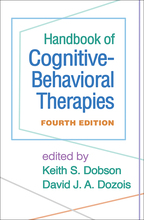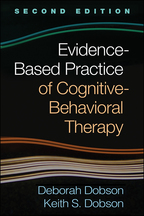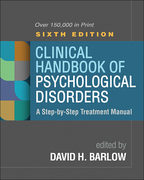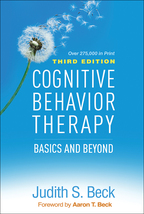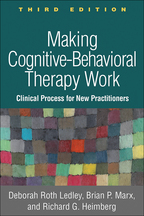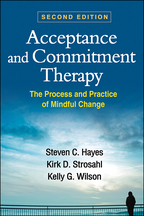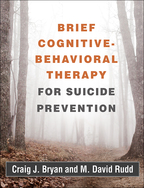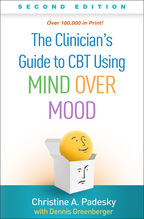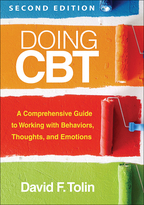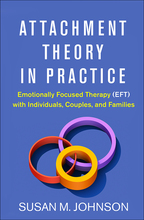Handbook of Cognitive-Behavioral Therapies
Fourth Edition
Edited by Keith S. Dobson and David J. A. Dozois
HardcoverPaperbacke-bookprint + e-book
Hardcover
orderMarch 12, 2019
ISBN 9781462538584
Price: $78.00 526 Pages
Size: 6⅛" x 9¼"
Paperback
orderApril 23, 2021
ISBN 9781462547722
Price: $52.00526 Pages
Size: 6⅛" x 9¼"
“This excellent book describes the principles and various therapies within the CBT tradition. It contains case examples that highlight how the theory is applied. The fourth edition is justified because of the burgeoning amount of research since the previous edition.”

—Doody's Review Service
“A mainstay in the cognitive behavioral field....Provides a sophisticated and intelligent empirical base from which clinicians can base their psychotherapy. This makes this book highly recommended not only for psychology, nursing, or research students at graduate level and beyond, but for all therapists who want empirically based, up-to-date knowledge on our ever broadening therapy.”

—Behavioural and Cognitive Psychotherapy (on the third edition)
“The editors have assembled an outstanding group of clinical researchers to describe the most important forms of CBT, their empirical and historical bases, and the challenges of disseminating and adapting them for different populations. The volume also includes a valuable chapter on common factors as well as issues related to therapeutic integration. This fourth edition is a crucial resource for graduate students, researchers, and clinicians wishing to learn about evidence-based therapies.”

—Sabine Wilhelm, PhD, Department of Psychiatry, Harvard Medical School; Chief of Psychology, Massachusetts General Hospital
“This well-written handbook presents need-to-know, state-of-the-science, clinically relevant guidelines for practitioners who want to deliver effective CBT. As a complement to books organized by disorder, this handbook tackles assessment, the various therapies, specific populations, and extending the reach of CBT. This is an invaluable text for training in evidence-based treatment and an excellent resource for seasoned clinicians.”

—Steven A. Safren, PhD, ABPP, Department of Psychology, University of Miami
“Many of the leading figures in CBT have contributed to this comprehensively updated fourth edition. Chapters address the clinical and conceptual implications of the latest research on classic approaches, as well as recent influential developments, including transdiagnostic treatments and culturally informed adaptations of CBT. The lucid explications of theory, objective reviews of research, and vivid descriptions of technique make this text ideal for graduate seminars and CBT practica alike.”

—David A. F. Haaga, PhD, Department of Psychology, American University
“Reading the fourth edition of this handbook made me reflect on the incredible advances that CBT has achieved over the past 40 years. Expert contributors have written compelling chapters on a broad scope of topics, from the history and philosophy of CBT to its scientific underpinnings, empirical evidence base, and clinical applications across an array of human problems. Major schools of thought are engagingly described—problem-solving therapy, rational emotive behavior therapy, cognitive therapy, mindfulness, and the integrative psychotherapy movement are all well represented. I cannot think of a finer graduate school textbook for a course on CBT, nor a better reference for practitioners.”

—Bruce A. Thyer, PhD, LCSW, BCBA-D, Distinguished Research Professor, Florida State University College of Social Work
—Doody's Review Service
“A mainstay in the cognitive behavioral field....Provides a sophisticated and intelligent empirical base from which clinicians can base their psychotherapy. This makes this book highly recommended not only for psychology, nursing, or research students at graduate level and beyond, but for all therapists who want empirically based, up-to-date knowledge on our ever broadening therapy.”
—Behavioural and Cognitive Psychotherapy (on the third edition)
“The editors have assembled an outstanding group of clinical researchers to describe the most important forms of CBT, their empirical and historical bases, and the challenges of disseminating and adapting them for different populations. The volume also includes a valuable chapter on common factors as well as issues related to therapeutic integration. This fourth edition is a crucial resource for graduate students, researchers, and clinicians wishing to learn about evidence-based therapies.”
—Sabine Wilhelm, PhD, Department of Psychiatry, Harvard Medical School; Chief of Psychology, Massachusetts General Hospital
“This well-written handbook presents need-to-know, state-of-the-science, clinically relevant guidelines for practitioners who want to deliver effective CBT. As a complement to books organized by disorder, this handbook tackles assessment, the various therapies, specific populations, and extending the reach of CBT. This is an invaluable text for training in evidence-based treatment and an excellent resource for seasoned clinicians.”
—Steven A. Safren, PhD, ABPP, Department of Psychology, University of Miami
“Many of the leading figures in CBT have contributed to this comprehensively updated fourth edition. Chapters address the clinical and conceptual implications of the latest research on classic approaches, as well as recent influential developments, including transdiagnostic treatments and culturally informed adaptations of CBT. The lucid explications of theory, objective reviews of research, and vivid descriptions of technique make this text ideal for graduate seminars and CBT practica alike.”
—David A. F. Haaga, PhD, Department of Psychology, American University
“Reading the fourth edition of this handbook made me reflect on the incredible advances that CBT has achieved over the past 40 years. Expert contributors have written compelling chapters on a broad scope of topics, from the history and philosophy of CBT to its scientific underpinnings, empirical evidence base, and clinical applications across an array of human problems. Major schools of thought are engagingly described—problem-solving therapy, rational emotive behavior therapy, cognitive therapy, mindfulness, and the integrative psychotherapy movement are all well represented. I cannot think of a finer graduate school textbook for a course on CBT, nor a better reference for practitioners.”
—Bruce A. Thyer, PhD, LCSW, BCBA-D, Distinguished Research Professor, Florida State University College of Social Work

